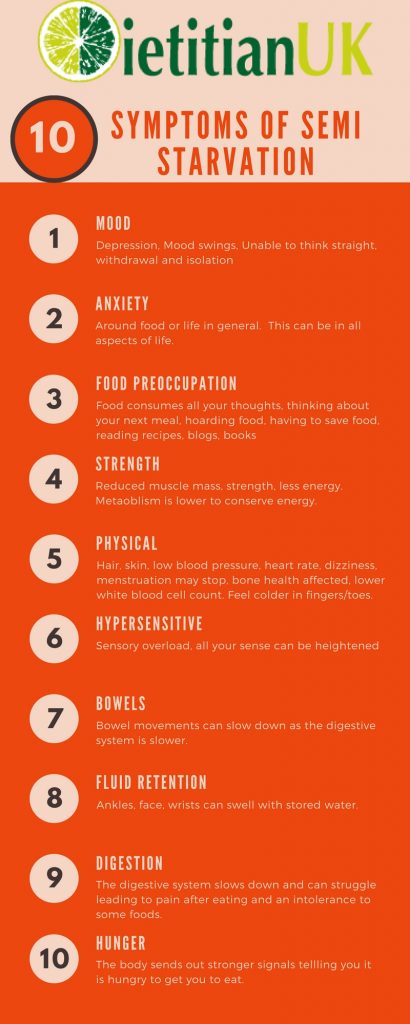One statement I hear regularly in my eating disorder clinics is “I feel like I’m going mad, all I think about is food”. Now whilst an eating disorder is a mental health illness it is not a sign of madness. However you can feel so consumed by your thoughts of food that it feel that way. Why? Well let’s have a look at some of the symptoms of being underweight….
Back in 1941 there was a landmark study conducted by Ancel Keys called the Minnesota experiment. The aim of this study was to get information on how to refeed those starving from famine conditions. 32 men completed the study, 12 of these were studied for 8 weeks to assess their baseline intake before the trial began. Then they were all starved for 24 weeks, with their intake reduced from 3,200kcals to just 1,600kcals/day served in 2 meals. which led to a 25% loss of body weight. Now take a note of the number of calories, yes these men would have been more active and lived a different lifestyle but 1,600kcals led to them being starved. Many of the diets that are advertised today are much lower in calories that this, so are they really healthy for our bodies?

Fascinatingly the men showed a lot of the symptoms we see in people suffered from an eating disorder. They become obsessed with food. Some read cookery book and stared at pictures of food. Cheating become a huge issue with them trying to find extra snacks. One man became psychotic, having vivid dreams of eating flesh and threatened to kill Keys, he was dismissed and after a few days these dreams and thoughts went away. This to me highlights the affect being a low weight can have on your thoughts and mental health. If you have an eating disorder and are a low weight that pre-occupation you have with food can totally be related to your body being undernourished. It is not you going loopy, it is the impact of being malnourished.

These men displayed a biological drive to eat, their hunger was increased and felt out of control. Keys ended up having to have each men chaperoned to stop them eating other snacks when not in the hospital. Our bodies are built to live and to live we need food. So they will do all they can to get us to eat. When you restrict your intake it makes perfect sense you will hungrier than before, stronger signals are being sent out and the body is going into amber alert. So that pre-occupation with food is actually a normal, biological sign that your body is working and doing it’s job.
The good news is, upon being re-fed, for most men, these symptoms disappeared. They were refer back to their usual weight and felt a lot better. Their thoughts, mood and emotional state improved alongside their physical healthy. Some of these men were interviewed in 2003 and they reported being glad they took part in the study, but there being some lingering after-effects. Some were worried about food deprivation for years afterwards. This can also be seen sometimes in recovery from an eating disorder, which is why it is important to focus on recovery happening in stages and being a continual work in progress.
If any of this has hit home to you and you feel like you need some support, do get in contact with me, see your GP for advice or check out the B-eat website who have a helping and a list of eating disorder specialists. Taking that first step can be the hardest but with good support around you, recovery really is possible.